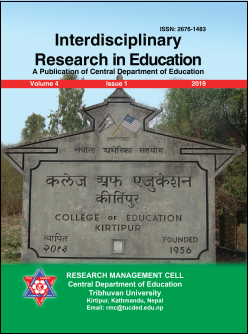Revealing the Story of an Individual through Narrative Inquiry : A Methodological Review
DOI:
https://doi.org/10.3126/ire.v6i1.43425Abstract
In this paper I have discussed about the narrative inquiry research design. The story of the participant is collected by the researcher through inquiry. The story is re-storied by the researcher and finally revealed. A good bond should be made between the researcher and participant(s) in order to gather required amount of data. The aim of my article is to find out the way of revealing individual stories by using narrative research design. I have used secondary data from books, articles, and dissertations as a methodological review. From the methodological reviewthe sample size for narrative research design is flexible, where there can be participation of one to twenty five participants. Arigorous interview with the participants should be taken one to three times or until the saturation of data. Typically, one to two cases can be observed while developing the story from the narrative inquiry. Similarly, methods of data collection are: interview, observation, focus group discussion for direct study of participants. Data collection tools used are:interview guideline, structured, semi-structured, and unstructured questionnaires, observations schedule, documentation of participation, and transcripts. The researcher develops the “codes” from the interview text or interview transcript, “categories” the codes in related groups and finally develops the “themes” from the categories which relate to the objectives and research questions. Ethical consideration is necessary for the secrecy of participants as the norms of qualitative research and trustworthiness is also the must for the validation of data.
Downloads
Downloads
Published
How to Cite
Issue
Section
License
This license enables reusers to distribute, remix, adapt, and build upon the material in any medium or format for noncommercial purposes only, and only so long as attribution is given to the creator.




